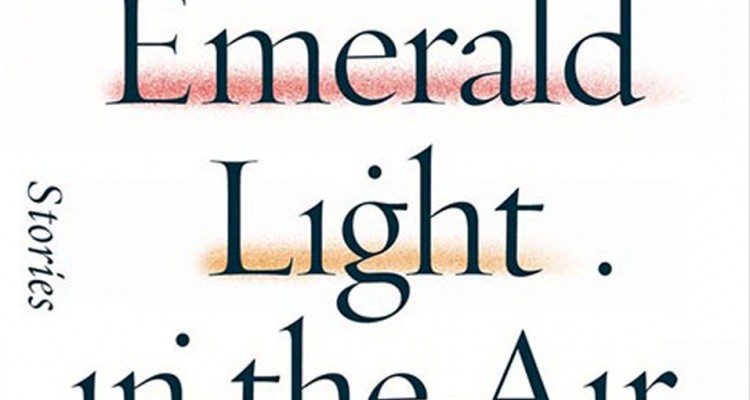Books & Culture
REVIEW: The Emerald Light in the Air by Donald Antrim

The title story of Donald Antrim’s harrowing collection of stories opens with a man named Billy French driving to the town dump where he plans to dispose of his ex-wife’s paintings and a box of his boyhood comic books. Along for the ride is a Browning .30–06 rifle. We are told, ominously, that Billy “wasn’t a gun nut, and he didn’t hunt.” Later, in one of the story’s many flashbacks to Billy’s time in a psychiatric hospital, he recalls a burning sensation that he felt in his temple, “a beckoning, an itch, a need for a bullet.”
Fans of Antrim’s debut novel Elect Mr. Robinson for a Better World might expect this story to end in death, perhaps even a hilariously grotesque and grisly death, but Antrim is up to something very different, and something very personal, in The Emerald Light in the Air, his first book of short fiction. The one exception is the opening story, “An Actor Prepares,” which pulses with the same energy as Antrim’s novels (in addition to Elect Mr. Robinson for a Better World, Antrim is the author of the equally excellent novels The Hundred Brothers and The Verificationist). This absurdist tale of an absurdist staging of A Midsummer Night’s Dream is alone worth the price of admission. The story stands apart in both tone and theme from the rest of the collection. The other six stories feature men hobbled by self-doubt and self-loathing, a history of ex-wives and clinical depression, but instead of feeling repetitive or one-note, these stories read like shards from the same broken mirror, a mirror that reflects a writer looking back on his life and career and wondering if it was worthwhile.
Much of the self-doubt and self-loathing in these stories is borne of a comically heightened sense of self-awareness. In “Pond, With Mud,” we meet Patrick Rose, a hobbyist poet who is tasked with taking his fiancée’s son to the zoo. Patrick spends most of day jotting down lines of imagist poetry in his notebook and wondering things like, “Would he never know what it was that he was trying to think about himself?” In “Ever Since,” we learn that after Jonathan’s wife left him he “had taken up a new side of his personality.” This new side of Jonathan apparently involves butting into peoples’ conversations at a book party and then worrying about whether or not he has said something offensive. The story “Solace” stars a man named Christopher who frets over whether or not he is really, truly funny as he and his girlfriend hop from apartment to apartment, eating takeout and having sex in the beds of the various people for whom they are housesitting.
Another way this comical self-consciousness is manifested throughout the book is an obsession with clothes. Again and again in these stories we find men watching women dress, men being critical of way women dress, and this sartorial awareness serves as both a mask for these men to hide behind, as well as a useful metaphor. In the story “He Knew,” Stephen takes his young girlfriend on a Madison Avenue shopping spree. We are told in Antrim’s droll narrative voice that Stephen “was an occasional clotheshorse himself, of course, at times when he was not housebound in a bathrobe.” In fact, Stephen is the kind of guy who can carry on a conversation about the relative merits of an Empire waist. And while he is attracted to the craftsmanship involved in the making of fine clothes, he is also aware of “the danger of seeing himself — literally reflected in the mirror of a bar, perhaps — as somehow faintly ridiculous.” This is the conundrum all writers face: is the pleasure of the process worth the possible embarrassment of exposing yourself in print?
The dark side of all this manic shopping is revealed in “Another Manhattan,” the most painful story in the collection. This story uses cell-phones to mimic the internal voices of a breakdown as Jim bounces between phone calls from all four corners of a love square (Jim’s wife is screwing his friend Elliot while Jim is screwing Elliot’s wife), all the while attempting to buy his wife a $341.60 bouquet of roses. Jim is bi-polar, and he has been in and out of the hospital because of his problems with “anxiety and suicidality.” Like many other characters in this collection, Jim’s manic highs result in the profligate spending of money, his wife’s money in this case because “he made all the gestures; she absorbed the costs.” We are also told that “on his way home from day care, as sometimes called his ongoing treatment, he’d got excited about life and jumped off the crosstown bus at Fifth Avenue and run into Bergdorf Goodman and ridden the elevator to the second floor and tried on clothes until closing.”
The collection closes with the title story, “The Emerald Light in the Air,” which is the best of the bunch. The beginning of Billy French’s story, the one with the ex-wife and the Browning .30–06, reads much like the other stories, almost eerily so. The figurative rut that all these men’s’ lives are stuck in is dramatized by Billy driving off a rural Virginia road and sliding ten feet down into a ditch, but Billy rejects the stasis and decides to drive his 1958 Mercedes down the rocky creek bed. In between electro-shock therapy flashbacks, Billy is flagged down by a boy who, for some reason, thinks Billy is the doctor come to help his dying mother. The boy takes him to their broken-down shack, and there, Billy is faced with a woman who reminds him of his own dying mother. Billy, of course, is not a doctor, but like nearly all the other men in this collection, he does have pills hidden in his pocket. Finally, he says to the worried husband, “I can help her.” This moment serves not only as Billy’s redemption, but also as an affirmation for the healing powers of Antrim’s own art. The closing paragraphs of this story are too beautiful to describe, and the reader is left with the feeling that they have just witnessed the writer’s moment of salvation.

by Donald Antrim










